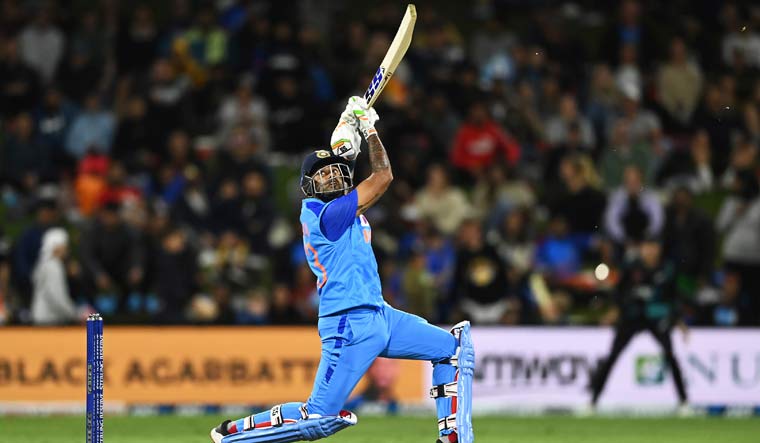The defeat to Australia in the just concluded ODI series is a timely wake-up call but there is no need to press the panic button yet as far as Indian team's World Cup preparations are concerned.
Suryakumar Yadav's hattrick of golden ducks -- first ball dismissals -- has already led to scathing criticism. But, if Shreyas Iyer is unavailable for the World Cup in October-November, Suryakumar remains the best bet at No. 4 going into the big event.
Suryakumar got a delivery each in the first two ODIs from Mitchell Starc that moved in the air and jagged back in after pitching on fuller length and 8 out of 10 times, batters would get dismissed from such balls.
The last ODI in Chennai saw Suryakumar playing a delivery, which he ought to have played on the front foot, by going back and he got out the first ball again. It showed he was confused and a certain amount of fear of failure, which he had not known till then, has crept in on him.
The string of low scores this month may actually be a blessing in disguise for him as he still has enough time to work on his flaws.
Suryakumar has problems with deliveries that seam after pitching on hard lengths and that is perhaps something he can work on in the next few months while playing the IPL.
To be fair, Iyer, despite his fine ODI record, still struggles against bouncers and short-pitched stuff but the Indian team management gave him chance to succeed.
However, Rahul Dravid's obsession with match-ups and shuffling of Suryakumar's batting order to bring out his T20 avatar in the 50-over format by keeping him for last 15 overs can do the Mumbai batter more harm than good.
The next set of ODIs will start from July and hence, if there isn't any fitness issue, Suryakumar should be backed to the hilt and given a chance to settle at No. 4.
This is more so as Iyer might not get enough time and matches to be ready for a tournament like the World Cup after his back surgery.
K.L. Rahul and a case for Sanju Samson
There is an outcry to try Sanju Samson in the middle-order but even if he is tried, it should be as a keeper-batter in place of K.L. Rahul, India's highest run-getter in the series with 116 runs, who still isn't looking the part with his distinct lack of intent.
Regarding Rahul, one can cite the 75 against Australia in Mumbai or the half-century against Sri Lanka at Eden Gardens after top-order collapse on seaming tracks as examples of good performances but the counter argument could be low chaseable targets on both the occasions when there was no scoreboard pressure.
A case in point on how Rahul lets the pressure build was that he was not able to hit a boundary till the 44th delivery he faced in the third ODI. He finally got out for 32 off 50 balls in a chase of 270.
Rahul batting in the middle order while chasing 320 and above may not also be a sure-shot proposition unless he is playing second fiddle to someone who is going hammer and tongs.
In that case and since Rishabh Pant is not available, Samson is the best option on offer.
Rajat Patidar, who was part of a few ODI series, wasn't tried out by the team management and that was an indication that the team management does not want to cast the net too wide.
Pitches during World Cup will be different
The World Cup starts on October 5 and with six months left, India's preparations will actually start three months prior to the tournament proper, that is in July when the team management would zero in on the best 13 players who will form the core group.
And, to put things in perspective, even if the Indian team is at its worst during the World Cup, it can afford to lose a maximum of four games and yet make it to semi-final where it would be a case of having two good knock out days just like it happened in Mohali and Mumbai back in title-winning campaign in 2011.
In that context, a series played in March on tired and end-of-season tracks would not be a fair indicator as to how things will pan out on fresh pitches just after receding monsoon that will be on offer during the marquee event.
However, there are a few loose ends that perhaps need tying up and one of them would be the approach of the team in terms of batting. Save Rohit Sharma, the top order isn't showing the requisite intent of attacking the opposition during the first Powerplay.
Of late, India's approach has been a bit outdated. It's similar to 1990s approach of consolidation in the beginning, quiet phase in middle over before trying the final flourish in back 10 against quality teams.
Against Australia in the first two games, the approach wasn't deliberate as Mitchell Starc and company bowled nippy spells to expose the poor technique or lack of it against moving deliveries.
But it's the Chennai game which could be a cause of worry as the Indian batters weren't able to rotate strike against the two Australian spinners on a surface where the home team players are more equipped than the visitors.
Rotation of strike in the middle overs has been a problem and it is yet to be sorted out.
The loose ends that the Indian team currently has can be tied up and the loopholes can be fixed. But it would depend on what kind of fix is coach Dravid looking at -- a quick fix or permanent solution.



